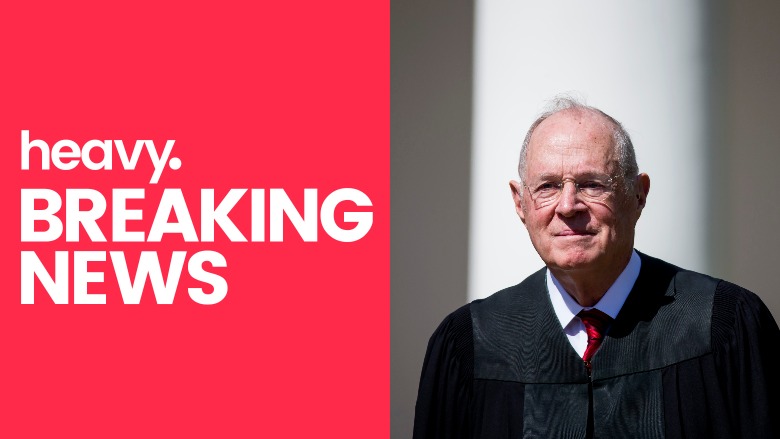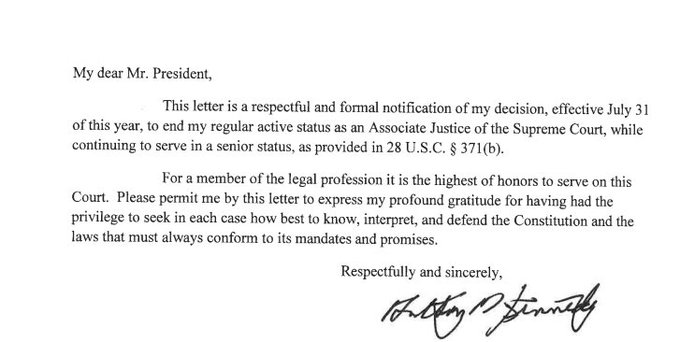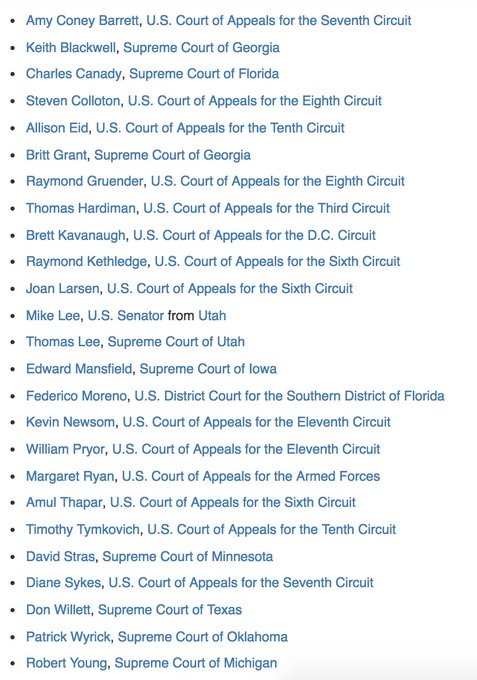
Getty Supreme Court Justice Anthony Kennedy has retired.
Supreme Court Justice Anthony Kennedy has retired, according to a letter he sent to President Donald Trump on Wednesday. You can read his retirement letter, tweeted by New York Times Supreme Court reporter Adam Liptak below:
“This letter is a respectful and formal notification of my decision, effective July 31 of this year, to end my regular active status as an Associate Justice of the Supreme Court, while continuing to serve in a senior status,” Kennedy wrote in the letter, which was delivered at the end of the most recent Supreme Court session. “For a member of the legal profession it is the highest of honors to serve on this Court. Please permit me by this letter to express my profound gratitude for having had the privilege to seek in each case how best to know, interpret and defend the Constitution and the laws that must always conform to its mandates and promises.”
Kennedy, 81, has been on the Supreme Court since 1988. He was nominated by President Ronald Reagan. Kennedy previously served on the U.S. Court of Appeals for the Ninth Circuit. He will turn 82 in July and is the court’s second-oldest justice, behind Ruth Bader Ginsburg, who is 85. Kennedy’s retirement will allow President Donald Trump to appoint another conservative to the court, following his appointment of Justice Neil Gorsuch to fill the vacancy left by the death of Justice Antonin Scalia.
Kennedy has been the swing justice since 2006, when moderate conservative Justice Sandra Day O’Connor retired. He voted with four other conservatives to gut the Voting Rights Act and to allow corporations and unions to spend unlimited funds to support candidates. But he voted with liberals in banning capital punishment for youthful offenders and helped shape the 2015 ruling that struck down bans on same-sex marriage.
“Justice Kennedy was the most important member of the court in a century, maybe ever,” Tom Goldstein, a lawyer who has argued before the court and published the SCOTUSblog website, told NBC News. “It’s not just that he was the pivotal vote so often. It’s that his thinking changed the country. Gay rights is the biggest example, but it’s not the only one.
In a 2010 interview, Kennedy reflected on his role in close decisions, telling CNN, “If the case is close 5-4 and let’s say you are on the side that prevailed with the majority, there are not a lot of high-fives and back slaps. There is a moment of quiet, a moment of respect, maybe even sometimes awe in the process. We realize that one of us is going to have to write out a decision which teaches and gives reasons for what we do.”
A senior White House official told CNN that Trump will push for a swift confirmation of a new Supreme Court justice “before the midterm elections.” Trump told pool reporter Hallie Jackson, of NBC News, that he will be picking from a list of 25 candidates that the White House previously circulated as possible Kennedy replacements. You can see the list here:
According to USA Today, the frontrunners are expected to be Thomas Hardiman, of Pennsylvania, who serves on the U.S. Court of Appeals for the 3rd Circuit and Raymond Kethledge, of Michigan, who serves on the 6th circuit. Newly confirmed federal appeals court judges Amy Coney Barrett, of Indiana, and Amul Thapar, are also potential nominees, USA Today reports.
Senate Majority Leader Mitch McConnell said Wednesday, “We will vote to confirm Justice Kennedy’s successor this fall.”
“Today, we thank Justice Anthony M. Kennedy for his 30 years of distinguished service on the Supreme Court of the United States. In 1987, President Reagan nominated him to the Court, and he was swiftly confirmed without opposition. A Californian, like the President who appointed him, Justice Kennedy is a true man of letters. During his tenure on the Court, he authored landmark opinions in every significant area of constitutional law, most notably on equal protection under the law, the separation of powers, and the First Amendments guarantees of freedom of speech and religion,” the White House said in a statement. “Justice Kennedy has been a tireless voice for individual rights and the Founders enduring vision of limited government. His words have left an indelible mark not only on this generation, but on the fabric of American history.”

